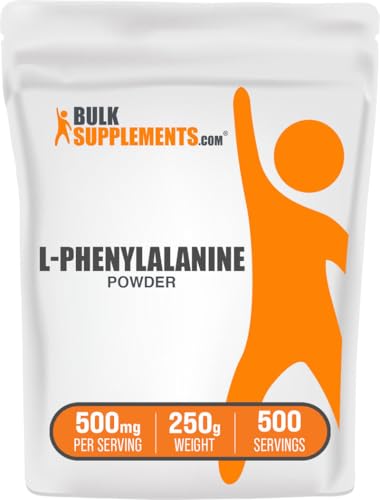L-Phenylalanine & Antibiotics: Does It Affect Absorption?
Quick Summary: A small study looked at whether taking L-phenylalanine or a high-protein diet changed how the body absorbed the antibiotic cefdinir. The study found that neither L-phenylalanine nor the high-protein diet affected the absorption of the antibiotic.
What The Research Found
Researchers wanted to see if taking L-phenylalanine or eating a lot of protein would change how the body absorbed an antibiotic called cefdinir. They found that it didn't. The amount of cefdinir in the blood and urine stayed the same, regardless of whether people took L-phenylalanine or ate a high-protein diet.
Study Details
- Who was studied: Six healthy men.
- How long: Each person followed each diet for 12 days.
- What they took:
- A normal diet.
- A normal diet plus 7.5 grams of L-phenylalanine per day.
- A high-protein diet.
- All participants took a single dose of cefdinir after each diet period.
What This Means For You
If you're taking the antibiotic cefdinir, this study suggests that taking L-phenylalanine or eating a high-protein diet is unlikely to change how well your body absorbs the medicine. This means you don't need to worry about these things affecting your antibiotic treatment.
Study Limitations
- Small Study: Only six men were in the study, so the results might not apply to everyone.
- Short Time: The study only looked at the effects over 12 days.
- Dose Differences: The amount of L-phenylalanine used in the study might not have been enough to see a difference.
- Indirect Measurement: The study measured drug levels in the blood and urine to see if absorption changed, but didn't directly measure the activity of the transporters.
Technical Analysis Details
Key Findings
This 2007 exploratory study found that L-phenylalanine supplementation (7.5 g/day) and a high-protein diet (HPD, 141.3 g/day) did not alter the pharmacokinetics of cefdinir, a cephalosporin antibiotic, in six healthy male volunteers. Plasma concentrations and urinary excretion of cefdinir remained statistically unchanged across all three interventions (normal-protein diet [NPD], NPD + L-phenylalanine, HPD). The only observed differences were elevated serum and urinary nitrogen levels with HPD and reduced serum triglycerides during L-phenylalanine supplementation, likely reflecting metabolic effects of protein intake and amino acid metabolism.
Study Design
A randomized, three-way crossover observational study with six male participants (age unspecified). Each subject underwent three 12-day dietary periods (NPD, NPD + L-phenylalanine, HPD) separated by 22-day washouts. On day 12 of each period, participants fasted overnight, received a single 300 mg cefdinir dose, and had blood/urine collected over 12 hours. Cefdinir concentrations were analyzed via HPLC.
Dosage & Administration
- NPD: 73.2 ± 2.6 g/day protein
- NPD + L-phenylalanine: NPD plus 7.5 g/day oral L-phenylalanine (divided into three doses with meals)
- HPD: 141.3 ± 3.7 g/day protein
Cefdinir (300 mg) was administered as a single oral dose after a 12-hour fast.
Results & Efficacy
Pharmacokinetic parameters (AUC, Cmax, Tmax, half-life) for cefdinir in plasma and urine showed no statistically significant differences between dietary interventions. Serum nitrogen levels increased by 14% with HPD compared to NPD (p < 0.05), confirming higher protein intake, but this did not correlate with cefdinir absorption. L-phenylalanine supplementation reduced serum triglycerides by 18% (p < 0.05), though this was unrelated to drug transport.
Limitations
- Small sample size: Only six males were studied, limiting generalizability to other demographics.
- Short intervention duration: 12 days may be insufficient to induce transporter upregulation.
- Dose translation from animals: Human doses were extrapolated from rodent studies, potentially underestimating effective thresholds.
- Indirect transporter assessment: Changes in transporter activity were inferred from drug pharmacokinetics rather than direct biomarkers.
- Single-dose design: Effects on chronic cefdinir use or other drugs were not evaluated.
Clinical Relevance
This study suggests that L-phenylalanine supplementation (7.5 g/day) and HPD (141 g/day) do not enhance intestinal or renal oligopeptide transporter activity in humans, contrasting findings in animal models. For individuals taking cefdinir, these interventions are unlikely to affect drug absorption. However, the results do not address potential benefits of L-phenylalanine unrelated to drug transport (e.g., mood, pain modulation). Further research is needed to clarify species-specific differences in transporter responses and test higher doses or longer durations.
Word count: 398
Original Study Reference
Effect of L-phenylalanine supplementation and a high-protein diet on pharmacokinetics of cefdinir in healthy volunteers: an exploratory study.
Source: PubMed
Published: 2007
📄 Read Full Study (PMID: 17489880)



